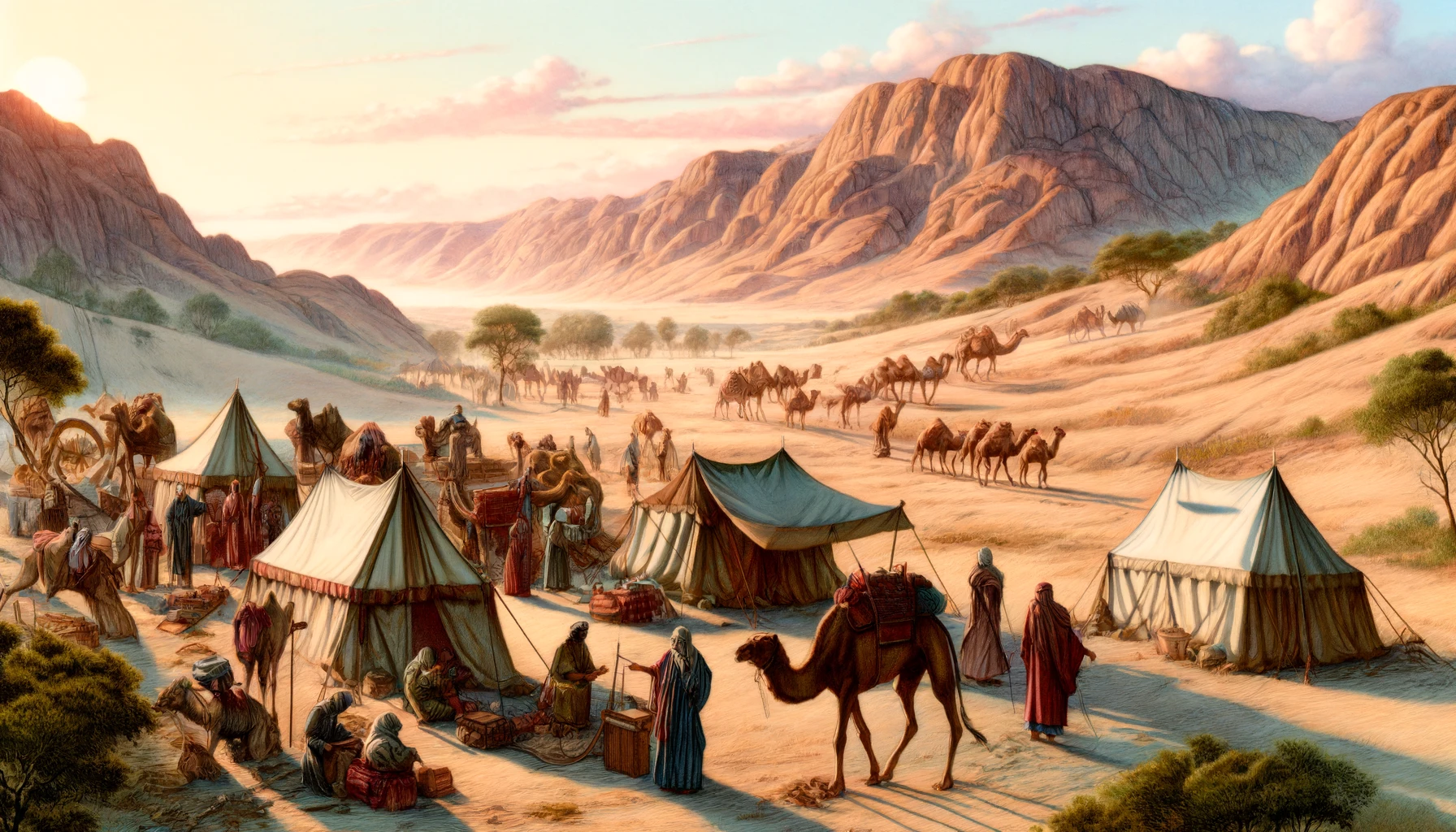
The Midianites
The Midianites were a nomadic people mentioned in the Bible, primarily in the Old Testament. Descendants of Midian, a son of Abraham by his concubine Keturah, they played significant roles in various biblical narratives.
Quick Facts:
- Origins: Descendants of Midian, son of Abraham and Keturah (Genesis 25:1-2).
- Nomadic Lifestyle: Known for their nomadic, pastoral lifestyle, often dwelling in tents (Judges 6:5).
- Joseph’s Sale: Involved in the sale of Joseph by his brothers (Genesis 37:28).
- Oppressors of Israel: Notably oppressed the Israelites during the time of the Judges (Judges 6-8).
- Moses’ Father-in-law: Moses’ father-in-law, Jethro, was a Midianite priest (Exodus 2:16-22).
Origins and Ancestry
The Midianites trace their lineage to Midian, one of the six sons born to Abraham and Keturah, his concubine after the death of Sarah (Genesis 25:1-2). This connection to Abraham places the Midianites among the broader Abrahamic family, though they often stood apart from the descendants of Isaac, Abraham’s son by Sarah.
Nomadic Lifestyle
The Midianites were primarily nomadic, living in tents and moving with their herds of livestock. This lifestyle is depicted in various biblical accounts, including the narrative of Gideon, where the Midianites are described as swarming like locusts with their camels and tents (Judges 6:5). Their nomadism enabled them to cover large areas of the Arabian Peninsula, often coming into contact—and conflict—with settled peoples.
Biblical Interactions
Joseph’s Sale:
The Midianites first appear in the Bible during the story of Joseph. Joseph’s brothers sold him to Midianite traders who were passing by, and they, in turn, sold him into slavery in Egypt (Genesis 37:28, 36). This event set the stage for Joseph’s rise to power in Egypt and the eventual migration of the Israelites there.
Moses fled to Midian after killing an Egyptian and there, he encountered Jethro (also called Reuel), a priest of Midian. Moses married Jethro’s daughter, Zipporah, and spent forty years tending Jethro’s flocks before being called by God to lead the Israelites out of Egypt (Exodus 2:15-22; 3:1). Jethro later visited Moses in the wilderness and offered him valuable advice on governance (Exodus 18).
Oppression of Israel:
One of the most significant encounters between the Israelites and the Midianites occurred during the time of the Judges. The Midianites, in alliance with the Amalekites and other eastern peoples, oppressed the Israelites, driving them to hide in caves and strongholds. This oppression lasted for seven years until God raised up Gideon to deliver Israel. Gideon, with just 300 men, defeated the Midianite army through a divinely inspired strategy (Judges 6-8).
Religious and Cultural Influence
The Midianites were polytheistic, worshipping a variety of gods. Their religious practices sometimes influenced the Israelites negatively. For instance, the incident at Peor involved Midianite women leading Israelite men into idolatry and sexual immorality, resulting in a plague that killed 24,000 Israelites (Numbers 25). This led to a command from God to Moses to take vengeance on the Midianites (Numbers 31).
Decline and Legacy
The power and influence of the Midianites waned after their defeat by Gideon. Their presence in the biblical narrative diminishes significantly after the period of the Judges. However, their interactions with key biblical figures left a lasting impact on Israelite history.
Conclusion
The Midianites were a significant group in the ancient Near East, known for their nomadic lifestyle and interactions with the Israelites. From the sale of Joseph to the counsel of Jethro and the oppression during Gideon’s time, the Midianites played pivotal roles in several biblical events. Their legacy is a testament to the complex and often tumultuous relationships among the ancient peoples descended from Abraham.



